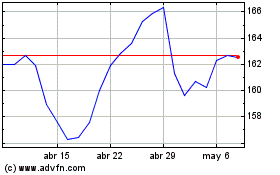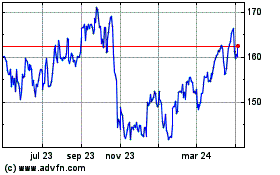By Kejal Vyas and Bradley Olson
CARACAS, Venezuela -- Venezuelan crude exports are declining
sharply as new U.S. sanctions push the country's oil industry
closer to collapse, threatening a bigger impact on global markets
than many experts anticipated, people familiar with the matter
say.
Oil storage is filling up in the country as President Nicolás
Maduro's regime struggles to line up buyers for the crude shipments
that make up his government's only real source of income. The U.S.
restrictions, aimed at redirecting crude revenue to opposition
leader Juan Guaidó, are making it difficult for the Maduro regime
to secure payment for the oil.
Production is also dropping due to labor problems, including
mass defections of workers struggling to survive hyperinflation and
delayed payments, as well as shortages of the imported oil
byproducts Venezuela needs to dilute its tar-like heavy crude to
push it through pipes to export terminals, the people say.
Tankers carrying products linked to Russia's PAO Lukoil, Spain's
Repsol SA and U.S. oil giant Chevron Corp. have been delayed,
halted or redirected in the past week as payment problems cloud
trade with Venezuela, according to people familiar with the
movements.
"This is an absolute disaster," said Luis Hernández, an oil
union leader. "There's almost no way to move the oil."
Venezuela oil czar Manuel Quevedo said his government is
demanding advance payment for oil shipments in light of the
sanctions, and is also looking for new buyers away from the U.S.,
without specifying where.
"This is going to have an impact on world oil markets," Mr.
Quevedo said on a pro-government television program Sunday, calling
the U.S. sanctions robbery. "This aggression will not go
unnoticed," he said.
Satellite images accessed through shipping tracking website
FleetMon over the weekend showed several dozen ships that normally
carry oil and oil byproducts idling in waters off Maracaibo, the
country's oil capital, providing visual evidence of the slowdown in
oil-related imports and exports. Several of the tankers had carried
cargoes to Corpus Christi, Texas, and New York in recent weeks,
according to FleetMon data.
Venezuelan authorities loyal to Mr. Maduro halted one oil
shipment scheduled to leave Maracaibo for the U.S. last Tuesday
over fears that proceeds would end up in the hands of Mr. Guaidó,
one person said. The ship was carrying crude from a field tapped
through a joint venture involving Chevron and state oil company
Petróleos de Venezuela, or PdVSA.
A Chevron spokeswoman declined to comment. Lukoil and Repsol
didn't return requests for comment.
The sanctions already appear to be affecting Venezuela's oil
production, people inside and outside the country said, though
estimates differed on the extent.
Oil union officials and people closely tracking the operations
of PdVSA said backlogs in exports had pushed oil production to well
below one million barrels a day, a more-than 10% drop from
December, and less than half what the country was producing 18
months ago.
Consultancy Wood Mackenzie Ltd. pegged production at 1.1 million
barrels a day.
Still, even some outside monitors are seeing big dropoffs.
Genscape, an analytics firm that monitors oil production worldwide
by tracking oilfield flares, estimated that on Thursday alone,
Venezuela output fell by around 60,000 barrels a day.
"That kind of decline is not out of the question largely due to
the challenges of sustaining production and the geopolitical impact
of redirecting the flow of crude and other products," said J.
Alexander Blackman, an executive at U.S. energy company Standard
Delta LLC.
It is unclear whether the production falloff will last. Much of
it depends on whether the U.S. gambit to target PdVSA will succeed
in ousting Mr. Maduro and putting oil revenue in the hands of the
country's opposition.
China and Russia continue to support Mr. Maduro and may be
capable of reversing the initial impact on the country's exports
and production, some analysts said.
Tens of thousands of Venezuelans took to the streets of Caracas
on Saturday to support Mr. Guaidó, whom the U.S. and other
countries have recognized as the country's interim president. But
Mr. Maduro's authoritarian government shows no immediate signs of
relinquishing power.
A prolonged standoff threatens to further batter the economy of
the once affluent country, which has been struggling for years with
food shortages, high rates of violent crime and the world's highest
inflation. The nation relies on petrodollars to import the vast
majority of its food supply as well as the blending components it
needs to produce gasoline, a crude reality for a country that sits
atop the world's biggest oil reserves. Oil workers and diplomats
say the country could run out of fuel supplies within a week,
including the diesel used for a large part of national power
generation, unless the government finds a solution to the
bottlenecks.
"This is fast turning into a war economy," said Evanán Romero, a
former deputy energy minister.
At least initially, the sanctions appear to be having a far more
significant impact on Venezuela's output than the Trump
administration anticipated. Treasury Secretary Steven Mnuchin said
last week that the U.S. was allowing certain companies to continue
making transactions with Venezuela for a limited period of time "to
minimize any immediate disruptions."
The sanctions allowed for a grace period until April for some
transactions, and extended licenses allowing some companies to
continue operations through the summer. But they call for payments
to Venezuela to be held in interest-bearing accounts until they can
be transferred to Mr. Guaidó's regime, a move that has all but
blocked business as Mr. Maduro's government remains in power.
Chevron, which has received an extended license to continue
working with PdVSA, said it has remained in close consultation with
the U.S. to ensure it is in compliance.
"The U.S. government has been very interested in engaging with
us to understand our position on the ground," Chevron Chief
Executive Mike Wirth said Friday. "For the foreseeable future, we
feel like we can maintain a good, stable operation and a safe
operation on the ground in Venezuela."
But the U.S. rules limiting the import of lighter oil and
products to dilute Venezuelan oil will make developing the
country's resources challenging, according to Wood Mackenzie. It
predicts Venezuelan production could fall to 900,000 barrels a
day.
Francisco Monaldi, a Venezuela energy expert at Rice University,
said the sanctions could cause the country's oil production to be
cut nearly in half over the next year and a half.
"If this lasts very long," Mr. Monaldi said, "it will definitely
have a very significant effect on the Venezuelan oil industry that
is already in a very precarious situation."
--Rebecca Elliott and Benoit Faucon contributed to this
article.
Write to Kejal Vyas at kejal.vyas@wsj.com and Bradley Olson at
Bradley.Olson@wsj.com
(END) Dow Jones Newswires
February 04, 2019 12:51 ET (17:51 GMT)
Copyright (c) 2019 Dow Jones & Company, Inc.
Chevron (NYSE:CVX)
Gráfica de Acción Histórica
De Mar 2024 a Abr 2024

Chevron (NYSE:CVX)
Gráfica de Acción Histórica
De Abr 2023 a Abr 2024
